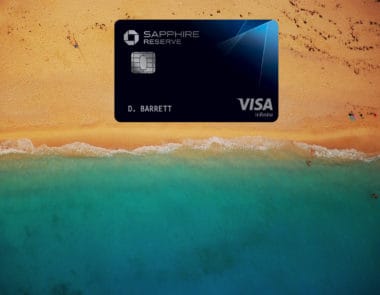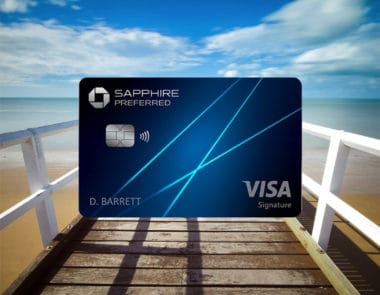Chase Sapphire Reserve vs. Sapphire Preferred Card – Which is Better in 2025?
The Chase Sapphire Preferred® Card and Chase Sapphire Reserve® are two of the best travel credit cards for flexible travel redemptions. Either card makes it easy to redeem rewards and features additional benefits like travel credits and trip insurance.
While there are many similarities between the two cards, there are distinct differences.
This Chase Sapphire Reserve vs. Chase Sapphire Preferred comparison helps you decide which card is better.
Table of Contents
Benefits at a Glance
Here is an overview of each card’s main benefits and fees.
| Chase Sapphire Preferred | Chase Sapphire Reserve | |
|---|---|---|
| Annual Fee | $95 | $550 |
| Authorized User Fee | $0 | $75 |
| Signup Bonus | 80,000 Ultimate Rewards after spending $4,000 in 3 months ($1,000 value) | 60,000 Ultimate Rewards after spending $4,000 in 3 months ($900 value) |
| Purchase Rewards | 5x on travel through Chase Ultimate Rewards 2x on all other travel 3x on dining, online grocery orders, and select streaming 1x for everything else | 10x on car rentals and hotels through Chase Ultimate Rewards 5x on flights through Chase Ultimate Rewards 3x on all remaining travel 10x on Chase Dining 3x on all remaining dining 1x on remaining purchases |
| Travel Redemption Bonus | 25% | 50% |
| Airport Lounge Access | None | Priority Pass Select |
| Notable Travel Benefits | $50 Anniversary Hotel Credit 10% bonus points each card anniversary 1:1 point transfers | $300 annual travel credit Global Entry or TSA PreCheck fee credit Luxury Hotel & Resort Collection benefits 1:1 point transfers |
| Partner Benefits | Lyft: 5x points through March 2025 DoorDash: 1 year of DashPass membership* Peloton: 5x points on qualifying purchases* *Valid through December 31, 2024 | Lyft: 10x points through March 2025 DoorDash: 1 year of DashPass membership* and $5 in monthly credits Peloton: 10x points on qualifying purchases* *Valid through December 31, 2024 |
| Further Reading | – List of Chase Sapphire Preferred Benefits – Chase Sapphire Preferred Credit Score Requirements – How to Use the $50 Hotel Credit | – List of Chase Sapphire Reserve Benefits – How to Use the $300 Travel Credit – How to use the $5 Monthly DoorDash Credit |
Read our Chase Sapphire Preferred and Chase Sapphire Reserve reviews to dig deeper.
Annual Fee
There is a wide gap between the Chase Sapphire annual fees:
- Sapphire Preferred: $95 for the primary card and $0 per authorized user
- Sapphire Reserve: $550 for the primary card and $75 per authorized user
These fees are similar to competing consumer and premium credit cards.
At first glance, the Sapphire Preferred annual fee is easier to recoup and is the clear-cut winner for casual travelers.
However, the Sapphire Reserve fee can be worth it if you can use its luxury travel benefits. While it’s a nuisance, the $75 authorized user fee is typical for premium cards and secondary members can also enjoy Priority Pass lounge access when they’re not flying with the primary.
Neither card has a foreign transaction fee.
Signup Bonus
The redemption value for the Sapphire Preferred card’s signup bonus is worth $1,000 for award travel and Chase Pay Yourself Back categories, while the Sapphire Reserve’s is worth $900.
Despite having the same 60,000 point welcome bonus, the Reserve redeems points at 50% more value compared to only 25% more valued for the Preferred.
The spending requirement is $4,000 in the first 3 months for both cards.
Further Reading: Chase Sapphire Preferred 80,000 Bonus Points Offer
Earning Ultimate Rewards
Both Sapphire products earn Chase Ultimate Rewards points, the most valuable credit card points for most redemptions.
As you might expect, the Sapphire Reserve lets you earn more points per dollar on travel. Rightfully so, as this is a premium travel card.
You earn the most points for either card when booking your travel purchases through the Chase Ultimate Rewards portal. More travel credit cards are adopting this approach.
In addition to how much you can earn on travel bookings, each card offers different non-travel bonus categories.
Chase Sapphire Preferred
You may prefer the Sapphire Preferred if you want to earn travel points on your grocery purchases:
- 5x on travel through Chase Ultimate Rewards (excluding the first $50 in qualifying hotel purchases)
- 2x on other travel purchases
- 3x on dining and eligible delivery services
- 3x for online grocery purchases (excluding Target, Walmart, and wholesale clubs)
- 3x on select streaming services
- 1x for non-bonus purchases
Travel, dining, and groceries purchases can usually be some of your bigger monthly purchases.
In addition to earning your initial rewards, you get a 10% point anniversary bonus. For example, you receive 6,000 bonus points on your card anniversary if you earn 60,000 points during the membership year.
This 10% bonus is exclusive to the Sapphire Preferred.
Further Reading: What Credit Score Do I Need for the Chase Sapphire Preferred? and How to Use the Chase Sapphire Preferred $50 Hotel Credit
Chase Sapphire Reserve
While you probably won’t get the Chase Sapphire Reserve just for the points, this is one of the highest-earning credit cards for travel and dining.
After automatically redeeming the $300 annual travel credit, you can earn up to 10 Ultimate Rewards per $1:
- 10x on hotels and car rentals through Chase Ultimate Rewards
- 5x on flights through Chase Ultimate Rewards
- 3x on all remaining travel purchases
This rewards structure is beneficial for road trips in addition to flights.
Your dining purchases will also earn bonus points:
- 10x on Chase Dining purchases
- 3x on dining and eligible delivery services
All non-bonus purchases earn 1 point per $1.
The Vacationer Tip
Tip: You will gain the most points by booking travel through Chase Ultimate Rewards. However, you still receive an above-average number of points if you prefer the peace of mind that comes from booking directly from the travel provider.
Chase Ultimate Rewards Travel Redemption Bonus
Booking award travel through the Chase Ultimate Rewards portal is the most valuable redemption option. You can book flights, hotels, car rentals, and excursions through this booking site.
Your points are worth 25% more (1.25 cents) with the Sapphire Preferred and 50% more (1.5 cents) with the Sapphire Reserve.
With the bonus, 10,000 points are worth $125 with the Preferred and $150 with the Reserve. For either card, the balance is only worth $100 for cash back and gift cards.
1:1 Point Transfers
Any credit card earning Chase Ultimate Rewards with an annual fee has point transfer capabilities.
Both cards let you transfer your Ultimate Rewards in 1,000-point increments to these participating airlines and hotels:
- Aer Lingus
- Air Canada Aeroplan
- British Airways
- Emirates
- Air France-KLM (Flying Blue)
- Iberia
- JetBlue
- Singapore Airlines
- Southwest Airlines
- United Airlines
- Virgin Atlantic
- IHG One Rewards
- Marriott Bonvoy
- World of Hyatt
Frequent Flyer Benefits
For most travel credit cards, you get the most mileage from your rewards points and card features if you fly several times a year.
The Sapphire Reserve offers these exclusive air travel benefits:
- Priority Pass Select lounge access
- Global Entry or TSA PreCheck application fee credit
- $300 annual travel credit (applies to non-flight bookings too)
The Sapphire Preferred doesn’t offer special air travel benefits beyond earning up to 5x points on bookings and the built-in travel insurance.
Hotel Benefits
Both cards offer some hotel benefits that can help you save money:
- Sapphire Preferred: Up to $50 in annual statement credits for hotel purchases through Chase Ultimate Rewards
- Sapphire Reserve: Complimentary Luxury Hotel & Resort Collection on-site amenities (average savings of $550)
Reserve cardmembers can also apply their annual travel credit to hotel purchases if they are part of the first $300 in yearly travel purchases.
The better option depends on what type of hotels you typically stay at. If you prefer the price and convenience of mid-tier hotel brands, the Sapphire Preferred wins.
But, if you can stay at participating luxury hotels, your Sapphire Reserve perks can include free breakfast, room upgrades, and spa treatments.
Travel Insurance
Both cards also offer some of the most generous travel insurance benefits when you pay for your entire booking with your Sapphire Card.
As you might expect, the Sapphire Reserve benefits are more robust but the Sapphire Preferred can still prevent you from buying a standalone policy for low-cost trips.
| Sapphire Preferred | Sapphire Reserve | |
|---|---|---|
| Trip Cancellation / Interruption | $10,000 per person and $20,000 per trip | $10,000 per person and $20,000 per trip |
| Trip Delay | Up to $500 per ticket after 12 hours of delays | Up to $500 per ticket for delays exceeding 6 hours |
| Lost Luggage Reimbursement | Up to $3,000 per person | Up to $3,000 per passenger |
| Baggage Delay | Up to $100 per day for 5 days | Up to $100 per day for 5 days |
| Rental Car Collision and Theft | Primary and up to the actual cash value of the vehicle | Primary coverage and up to $75,000 in damage |
| Roadside Assistance | $59.95 per dispatch | Up to $50 per incident and 4 service calls per year |
| Emergency Evacuation | None | Up to $100,000 for medical services and transportation |
You can also call and request travel and emergency assistance. It’s free to request help but third-party charges can apply for medical, legal, and travel aid.
Purchase Coverage
You can also qualify for reimbursement if your merchandise purchases go astray.
| Chase Sapphire Preferred | Chase Sapphire Reserve | |
|---|---|---|
| Purchase Protection | Up to $500 per claim and $50,000 per year | Up to $10,000 per claim and $50,000 per year |
| Extended Warranty | 1 additional year for warranties of 3 years or less | 1 additional year for warranties of 3 years or less |
| Return Protection | None | Up to $500 per purchase and $1,000 per year |
Partner Benefits
Both cards also offer limited-time travel and retail benefits with participating brands. Both cards tend to have better offers than most Chase credit cards with the Sapphire Reserve being better.
DoorDash
Both cards currently offer one year of free DashPass membership through December 31, 2024. This perk waives delivery fees and reduces the service fee on orders exceeding $12.
Sapphire Reserve cardholders also receive a $5 monthly DoorDash credit.
Lyft
Through March 2025, you will earn with 10x (Sapphire Reserve) or 5x (Sapphire Reserve) on Lyft rides.
Sapphire Reserve members were previously eligible for one year of Lyft Pink membership when enrolling before March 31, 2022. That benefit appears to have expired, and it remains to be seen if it will return.
Peloton
Through March 31, 2022, you can earn 10x or 5x Ultimate Rewards on qualifying Peloton Bike and Tread purchases exceeding $1,400:
- Sapphire Preferred: 5x (up to 25,000 points)
- Sapphire Reserve: 10x (up to 50,000 points)
When to Apply for the Chase Sapphire Preferred
The Chase Sapphire Preferred can be the better card for you in these instances:
- $95 Annual Fee: The budget-friendly annual fee is better if you don’t travel frequently or struggle to redeem the add-on benefits. You may also prefer the smaller annual fee if you already have at least one premium card with overlapping travel benefits.
- Free Authorized Users: Not paying another fee is convenient when you’re trying to earn the most points from card purchases.
- Multiple Ways to Earn Bonus Points: While you can only earn up to 5 Ultimate Rewards per dollar, you can earn bonus points on travel, dining, groceries, and streaming services. The Sapphire Reserve’s only bonus categories are travel and dining.
- Anniversary Bonus: The 10% anniversary bonus gives you a head start on booking your next award trip. It also helps fill the earning gap between both cards.
- Flexible Redemption Options: The 25% travel redemption bonus and 1:1 point transfers can give you a higher redemption value than most travel credit cards with an annual fee below $100.
- Annual Hotel Statement Credit: The $50 annual hotel statement credit offsets half of your annual fee. This credit applies to any hotel room you reserve through the Chase Ultimate Rewards portal.
- Complimentary Travel Insurance: The trip protection and car rental benefits offer above-average coverage amounts. Many credit cards are reducing or completely removing certain benefits.
When to Apply for the Chase Sapphire Reserve
The Chase Sapphire Reserve is one of the best premium travel credit cards. It’s superior to the Sapphire Preferred for these reasons:
- Extensive Luxury Travel Benefits: While the $550 annual fee is relatively expensive, your travel benefits can be worth more if you use them regularly. You will get the most value if you currently pay for perks like Priority Pass lounge visits, Global Entry, and on-site resort amenities.
- $300 Annual Travel Credit: The $300 annual travel credit automatically reimburses your first flight, hotel, car rental, and tourism purchases of the year. It also helps offset the annual fee.
- Airport Lounge Access: Priority Pass has lounges in most domestic and overseas airports and can be an excellent resting place during layovers. You and up to 2 guests can visit for free. A similar membership costs $429 per year plus $32 per visit for additional guests.
- Earn 10x Ultimate Rewards: Being able to earn up to 10 points per $1 on qualifying travel and dining purchases can help you accumulate more points. The higher-earning rate can also be more lucrative than only netting a few points on the Sapphire Preferred’s non-travel bonus categories.
- Higher Travel Redemption Bonus: The 50% travel redemption bonus helps you get more mileage from each point. Redeeming each point for 1.5 cents can be worth more than booking directly through the airline or hotel in most instances.
- Better Travel Insurance Benefits: You can have more peace of mind with the higher coverage amounts on certain perks. Another exclusive perk is up to $100,000 in emergency evacuation assistance.
The Vacationer’s Final Thoughts
Your travel frequency and travel budget are the most significant factors when deciding if the Chase Sapphire Reserve or Chase Sapphire Preferred is the better fit.
Consider the Chase Sapphire Reserve if you regularly book luxury travel or fly several times a quarter. This travel routine should be able to maximize the rewards program and additional benefits easily.
However, the Chase Sapphire Preferred is a competitive offering as you have a variety of ways to earn and redeem your Ultimate Rewards for maximum value. The annual fee also makes this card a better fit if you only take a few trips each year but still earn many bonus points.
Get The Vacationer Newsletter
Get highlights of the most important news delivered to your email inbox





